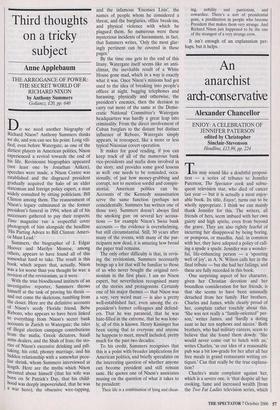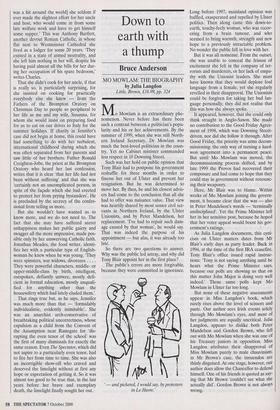An anarchist arch-conservative
Alexander Chancellor
ENJOY: A CELEBRATION OF JENNIFER PATERSON edited by Christopher Sinclair-Stevenson Headline, £15.99, pp. 224 his may sound like a doubtful proposi- tion — a series of tributes to Jennifer Paterson, The Spectator cook and subse- quent television star, who died of cancer last year — but it is actually a most enjoy- able book. Its title, Enjoy!, turns out to be wholly appropriate. I think we can mainly thank Jennifer for this. The writers, all friends of hers, seem imbued with her own gaiety and high spirits, even from beyond the grave. They are also rightly fearful of incurring her disapproval by being boring, or pompous, or maudlin. And, in common with her, they have adopted a policy of call- ing a spade a spade. Jennifer was a wonder- ful, life-enhancing person — a 'spouting well of joy', as A. N. Wilson calls her in the final tribute — but she had her failings, and these are fully recorded in this book.
One surprising aspect of her character, given her Christian devotion and her boundless consideration for her friends, is that she seems to have been unusually detached from her family. Her brothers, Charles and James, while clearly proud of her, complain rather touchily about this. `She was not really a "family-oriented" per- son,' writes James, and 'hardly a doting aunt to her ten nephews and nieces.' Both brothers, who had military careers, seem to believe that she found them dowdy. 'She would never come out to lunch with us,' writes Charles, 'as our idea of a reasonable pub was a bit low-grade for her after all her free meals in grand restaurants writing cri- tiques.' Can that really be the true explana- tion?
Charles's main complaint against her, which is a severe one, is 'that despite all her cooking, fame and increased wealth [from the Two Fat Ladies television series, which was a hit around the world] she seldom if ever made the slightest effort for her uncle and host, who would come in from some late welfare work and have to get himself some supper.' This was Anthony Bartlett, another devout Roman Catholic, in whose flat next to Westminster Cathedral she lived as a lodger for some 20 years. 'They existed in a state of armed neutrality, and she left him nothing in her will, despite his having paid almost all the bills for her dur- ing her occupation of his spare bedroom,' writes Charles.
That she didn't cook for her uncle, if that is really so, is particularly surprising, for she insisted on cooking for practically everybody else she knew — from the Fathers of the Brompton Oratory on Christmas Day to people so peripheral to her life as me and my wife, Susanna, for whom she would insist .on preparing food for us to eat on our drives to Italy for the summer holidays. If charity in Jennifer's case did not begin at home, this could have had something to do with her turbulent, international childhood during which she was often separated from her parents and saw little of her brothers. Father Ronald Creighton-Jobe, the priest at the Brompton Oratory who heard her last confession, writes that it is clear 'that her life had not been without suffering' and that she was `certainly not an uncomplicated person, in spite of the façade which she had erected to protect her from prying bystanders'. He is precluded by the secrecy of the confes- sional from telling us more.
But she wouldn't have wanted us to know more, and we do not need to. The fact that she may have suffered secret unhappiness makes her public gaiety and swagger all the more impressive, made pos- sible only by her unswerving Catholic faith. Jonathan Meades, the food writer, identi- fies her with a particular type of English- woman he knew when he was young. 'They were spinsters, war widows, divorcees . . They were powerful characters, middle- or upper-middle-class by birth, intelligent, outspoken, defiantly untwee, mostly defi- cient in formal education, mostly unquali- fied for anything other than the housewifery which had lately eluded them.'
That rings true but, as he says, Jennifer was much more than that — 'formidably individualistic, evidently inimitable'. She was an anarchist arch-conservative of breathtaking political uncorrectness, whose expulsion as a child from the Convent of the Assumption near Ramsgate for 'dis- rupting the even tenor of the school' was the first of many dismissals for exactly the same reason. Even The Spectator, which did not aspire to a particularly even tenor, had to fire her from time to time. She was also an incorrigible show-off who craved and deserved the limelight without at first any hope or expectation of getting it. So it was almost too good to be true that, in the last years before her brave and exemplary death, the limelight finally sought her out.



















































































 Previous page
Previous page